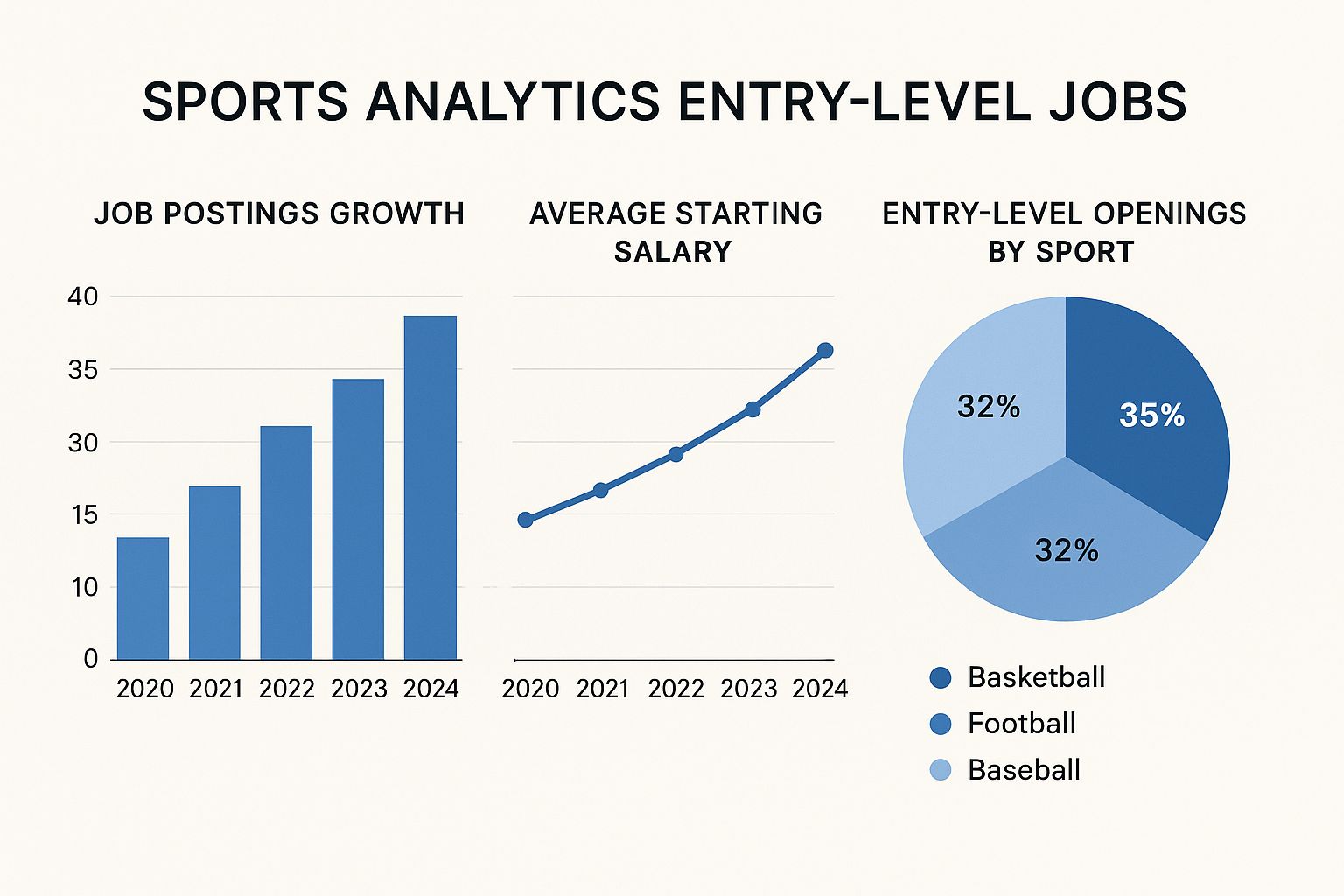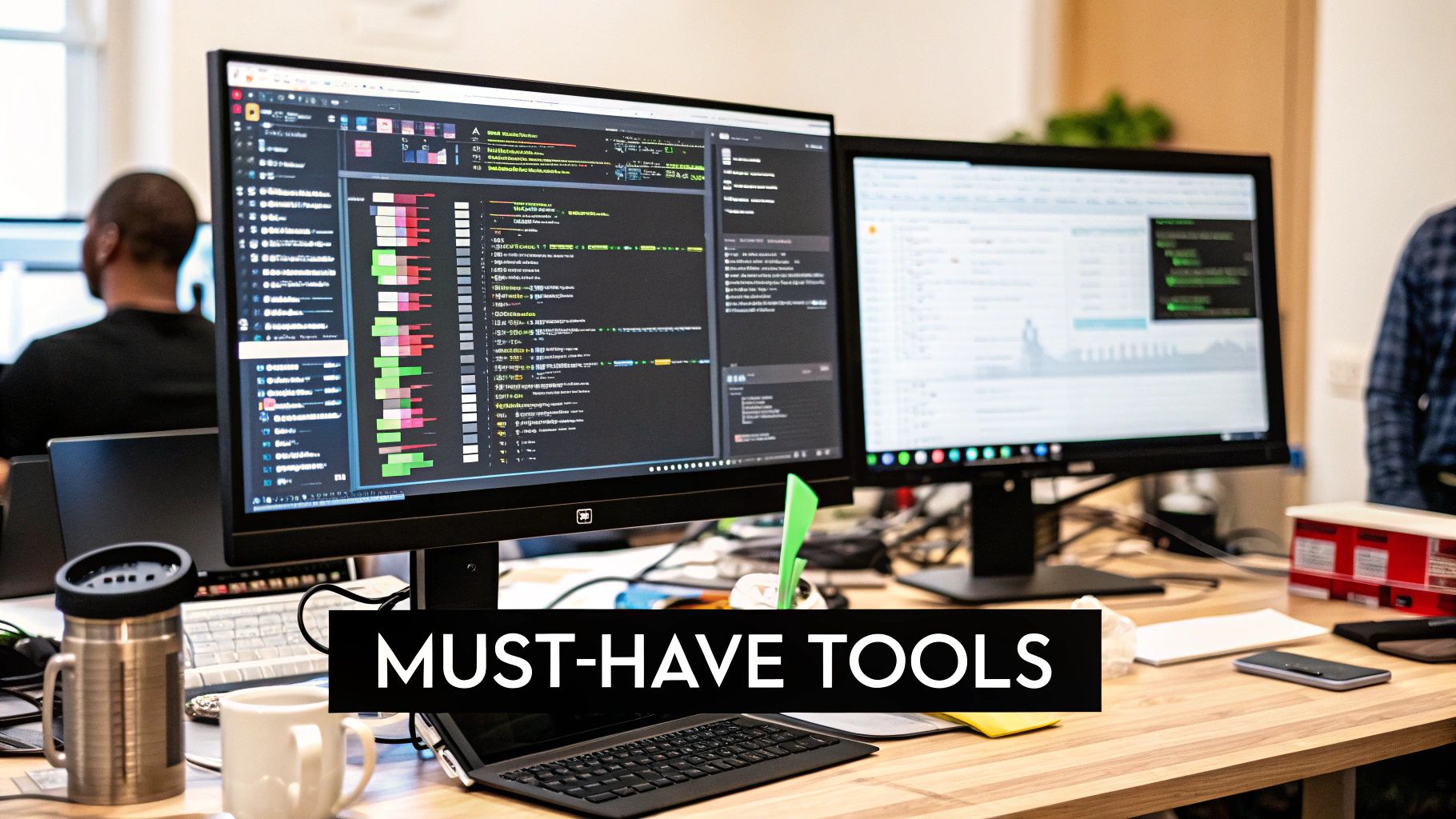
Ultimate Guide to Sports Analytics Entry Level Jobs | Start Your Career
Breaking into sports analytics feels more possible right now than it ever has. The field is exploding, using data to find that razor-thin competitive edge. It seems like every team, league, and media company is on the hunt for sharp analytical minds.
Why Sports Analytics Is Blowing Up
The days of relying purely on gut instinct to run a sports team are long gone. Today, every organization, from major league powerhouses to college programs, is spinning up a data department. They're all chasing the next big statistical advantage, whether that's in scouting players, tweaking in-game strategy, or connecting with fans.
This data-driven shift has created a huge demand for people who can actually make sense of all this information.
Data analysis is now a core part of the game in every sport. Think about it:
- Player Performance: Teams are analyzing biometric data to fine-tune training regimens and, just as importantly, keep their stars off the injured list.
- Scouting and Recruitment: Predictive models are being used to spot undervalued talent that other teams might overlook in the draft.
- In-Game Strategy: Coaches are making real-time calls based on deep dives into opponent tendencies and statistical probabilities.
- Fan Engagement: Front offices are personalizing everything from marketing emails to in-stadium experiences for their most loyal fans.
The Numbers Don't Lie
The market itself tells a compelling story. The global sports analytics market is on a steep climb, projected to hit a staggering $4.6 billion by 2025. That's a massive leap from its $880 million valuation back in 2020, which works out to a compound annual growth rate of over 31%.
There are currently around 1,445 sports analyst jobs open, with an average salary sitting above $79,000. The demand is real and growing. For a deeper look at the career landscape, the research from KU's online sport management program is a great resource.
This graphic really paints the picture, showing how both job postings and starting salaries have been on the rise.

The trend is clear: more jobs and better pay. It’s a fantastic time to be getting started. If you're eager to see what's out there, you can browse current sports analytics entry level jobs right now.
Common Entry Level Sports Analytics Roles and Salaries
To give you a clearer idea of what your first job might look like, here's a glance at some common entry-level roles and what you can expect to earn. These are just starting points, but they show the kind of potential that's out there right from the beginning of your career.
| Job Title | Average Annual Salary |
|---|---|
| Data Analyst, Sports | $65,000 - $85,000 |
| Junior Quantitative Analyst | $70,000 - $90,000 |
| Performance Analyst | $60,000 - $80,000 |
| Video Analyst | $55,000 - $75,000 |
| Scouting and Analytics Coordinator | $50,000 - $70,000 |
As you gain experience and specialize, these numbers can climb significantly. Think of your first role as the crucial first step onto a very promising career ladder.
What This Means for You
If you love sports and have a knack for numbers, this industry growth is your signal to jump in. Organizations are actively seeking fresh talent and new perspectives to fill roles that, frankly, didn't even exist a decade ago.
The key takeaway is simple: the industry needs more analysts than ever. Teams need storytellers who can translate numbers into winning strategies on and off the field.
This guide is here to show you exactly how to position yourself as a top candidate. We’ll get into the specific skills you need to build, how to make your resume impossible to ignore, and where to find these incredible opportunities. Your journey into the world of sports analytics starts right now.
Mastering the Essential Technical and Soft Skills

If you want to land one of those entry-level sports analytics jobs, passion for the game is just the price of admission. Your actual skillset is what gets you in the door.
Teams are looking for a unique mix of technical chops and personal traits. Think of it like building your own player profile, every skill you add boosts your value and makes you a more attractive draft pick.
Let's start with the technical side. It all boils down to the languages of data. Python and R are the industry standards. Python is incredibly versatile, especially with libraries like Pandas for slicing and dicing data. R, on the other hand, is a beast for pure statistical modeling. You don’t have to master both overnight, but you absolutely need to be solid in at least one.
And don't forget about databases. You'll constantly be pulling, cleaning, and managing information, which makes SQL (Structured Query Language) an indispensable tool in your arsenal.
Core Technical Competencies
Having the raw skills is one thing, but what really gets you hired is showing you know how to apply them. Can you run an analysis and make the results make sense to a coach, scout, or GM who doesn't live and breathe spreadsheets?
- Statistical Analysis: You have to understand concepts like regression, probability, and what "statistically significant" actually means. It's about finding the real signal, not just random noise.
- Data Visualization: A screen full of numbers is useless to most people. Getting good with tools like Tableau or Power BI lets you build charts and dashboards that tell a compelling story. This is a skill you'll see mentioned in tons of job descriptions.
- Machine Learning: While it's not always a hard requirement for entry-level spots, having a basic grasp of machine learning models for prediction and classification will make you a much, much stronger candidate.
If you want to find your next job in sports analytics, you can visit www.sportsjobs.online to see the latest openings and discover what skills teams are looking for.
The Soft Skills That Seal the Deal
Your technical skills get your resume into the "yes" pile. Your soft skills are what get you through the interview and help you actually succeed once you're on the team.
Sports analytics is a team sport. You’ll be working with people from totally different worlds, coaches, trainers, front-office execs, and most of them are not data experts.
The best analysts are translators. They can take a complex dataset, pull out a key insight, and explain it to a coach in a way that directly impacts the next game plan.
This is where communication becomes your most powerful tool. Can you present your findings clearly? Can you stand your ground and defend your methodology when someone questions it?
Beyond just talking a good game, hiring managers are looking for these traits:
- Problem-Solving: You're going to get hit with messy data and vague questions. You need the creative thinking to figure out a path forward when there isn’t a clear one.
- Curiosity: The best insights come from asking "why?" and being genuinely driven to dig deeper than anyone else.
- Teamwork: You're not a lone wolf. You’ll be collaborating with video coordinators, software engineers, and scouts. Proving you can be a valuable part of that ecosystem is non-negotiable.
Your main goal is to build this blend of hard and soft skills. It shows you have the analytical horsepower to do the work and the communication skills to make that work count.
Alright, let's get that resume looking like a winner.
How to Build a Resume That Stands Out
Think of your resume as your ticket to the interview. In the world of sports analytics, a generic, one-size-fits-all resume gets tossed in the 'no' pile almost immediately. This field is incredibly competitive, so your resume needs to be laser-focused to grab a hiring manager's aattention.
Forget thinking about it as a boring list of past duties. Your resume is your personal highlight reel, a showcase of your analytical wins. Every single line should scream one thing: "I can find meaningful, game-changing insights in data."
Vague statements like "analyzed team data" are completely useless. They don't tell anyone anything. You have to show the impact of your work.
Quantify Everything You Can
If you do only one thing to improve your resume, do this: add numbers. Quantifying what you've accomplished is the most powerful change you can make. It turns vague claims into hard proof of your skills and shows the real value you can bring to a team.
So, instead of that weak "analyzed team data" line, you flip the script. Try something like this: "Identified key defensive shifts that correlated with a 15% reduction in points allowed." See the difference? One is fluff, the other is a powerful, data-backed statement that gets people excited.
Here are a couple more quick examples of how to transform your bullet points from bland to brilliant:
Before: Created a player performance dashboard.
After: Developed a player performance dashboard in Tableau that slashed report generation time by 10 hours per week for the coaching staff.
Before: Worked on a scouting project.
After: Built a predictive model in Python that accurately identified 3 undervalued draft prospects, two of whom were later signed by the team.
These specifics prove you get the bigger picture, you understand how analytics actually connects to winning. That’s what teams are desperately looking for. You can start getting ideas for your own projects by checking out the real job listings on www.sportsjobs.online and seeing what skills teams are asking for right now.
Your resume’s only job is to answer one question for the hiring manager: "How can this person help us win more games?" Every bullet point needs to build a rock-solid case for that.
Tailoring Your Sections for Sports Analytics
You need to structure your resume to put what matters most right at the top. The standard chronological format might not be your best bet, especially if your most impressive work is a personal project you built on your own time, not a formal job.
Consider a structure more like this:
- Contact Info & Portfolio Link: This goes right at the very top. Your name, phone, email, and a can't-miss link to your online portfolio (your GitHub or personal website is perfect).
- Summary: Keep it short and punchy. Just 2-3 sentences that hit on your key analytical skills (like Python, SQL, Tableau) and your specific passion for a sport.
- Projects: For entry-level roles, this is often your MVP section. Go into detail on 2-3 of your best projects. What was the problem you were trying to solve? What tools did you use? And most importantly, what did you find?
- Experience: List any internships or jobs you've had. Remember to focus on quantifying your impact here, just like we talked about.
- Skills: Make this section clean and super easy to scan. Group your technical skills into logical categories like Programming Languages, Databases, and Visualization Tools.
- Education: Your degree, university, and graduation date. You can also mention specific, relevant coursework if it lines up perfectly with the job you want.
Where to Find Your First Sports Analytics Job

Knowing where to look is half the battle. In any job search, really. But for sports analytics, it means skipping the giant, generic job boards and going straight to where the teams, leagues, and sports tech companies actually post their openings. Your dream job won’t just fall into your lap, you have to go find it.
Your first move should be to hit the specialized, industry-specific job boards. These platforms cut through all the noise you find on massive sites, connecting you directly with the right employers. If you're serious about this, you can stop the endless scrolling and start exploring curated sports analytics jobs right now at www.sportsjobs.online.
Another fantastic, direct route? Go straight to the source. Every single major pro team, from the NFL to the Premier League, has a "Careers" or "Jobs" page on its official website. Make a list of your top 10 or 20 target organizations and get in the habit of checking their sites weekly. These are often the very first places new roles appear.
Key Places to Hunt for Openings
While the big sites like Indeed can feel like searching for a needle in a haystack, they still have value. The trick is to get hyper-specific with your search terms. Don't just type in "data analyst." Instead, try "baseball analyst," "performance analyst," or "sports data scientist."
As of 2025, a quick search on a major board like Indeed shows over 200 entry-level sports analytics positions available globally. That tells you the hiring landscape is very active. These aren't just one type of role, either. You'll see everything from Associate Research Analyst positions to specialized roles like a Baseball Analyst within a specific team. You can even find entry points through traineeships in sports marketing analytics, which blend data with the business side of sports.
Take a look at the current landscape of sports analytics jobs on Indeed.com yourself to get a feel for the sheer variety of opportunities out there.
Here’s the thing, though: Networking is your secret weapon. So many jobs in the sports world are filled through connections long before a public job posting ever goes up. A strong professional network can be the inside track you need.
Building Your Professional Network
Start on LinkedIn. Seriously. It’s so much more than a digital resume; it's a dynamic networking machine. Follow the companies you'd kill to work for, connect with people already in analytics roles, and actually engage with their posts.
And please, don't just send a generic connection request. Add a personal note. Mention a project they worked on, a shared interest in a specific sport, or an article they shared. This tiny bit of effort makes a massive difference.
For instance, if you come across a Sports Data Scientist role that looks interesting, find analysts at that company on LinkedIn and start building those connections before you apply.
Attending industry events, even virtual ones, is another great way to meet people. Look for conferences, webinars, or local meetups focused on sports analytics. These events are literally designed for making connections. Have a quick, confident summary of who you are and what you're passionate about ready to go. You never know when a casual conversation could turn into your first big break.
Acing the Interview and Getting the Offer

So, all that hard work on your resume and portfolio paid off, you’ve landed an interview. Congrats! This is your shot to prove you’re the real deal. It's where you show you have the technical chops, the problem-solving mindset, and a genuine, undeniable passion for the game.
Interviews for sports analytics jobs are a different beast. They're a unique mix of technical grilling, behavioral questions, and sports-specific challenges. You absolutely have to be ready for all three.
Navigating the Technical and Behavioral Questions
First up, the technical stuff. This part is all about validating what you put on your resume. You can bet you'll be quizzed on your knowledge of SQL, Python or R, and core statistical concepts.
Be prepared to walk them through a project from your portfolio. You'll need to explain your methodology, talk about the hurdles you hit, and justify the decisions you made along the way.
Then come the behavioral questions. These are designed to see how you think and if you'll click with the team culture. They want to hear stories about how you've solved a tough problem or, just as importantly, how you've explained a complex analysis to someone non-technical, like a coach or a scout.
The real goal here is to articulate your thought process. Honestly, showing how you logically approach a problem is often more important to a hiring manager than just spitting out the "right" answer.
Want a sneak peek at what teams are looking for? Browse active job listings. Looking over a post like this Sports Performance Analyst position can give you huge clues about the specific skills and qualities you should be highlighting in your interview.
Tackling the Take-Home Case Study
Many, many teams use a take-home case study. This is probably your single best opportunity to flex your analytical muscles in a real-world scenario. They'll typically hand you a dataset and a specific question they want you to answer.
Here are a few tips to crush it:
- Actually Understand the Question: Before you write a single line of code, read the prompt three times. Make sure you know exactly what they're asking for.
- Document Everything: Comment your code like your life depends on it. Your goal is to make it dead simple for the reviewer to follow your logic from start to finish.
- Go Beyond the Obvious: Nail the basics, but then try to dig up one or two unique insights that others might miss. This shows initiative and creativity.
- Visualize Your Findings: Don't just hand over a script and a CSV file. Create clean, compelling charts and graphs to help tell the story buried in your data.
Once you submit your case study, be ready to defend it. In the next interview, they will almost certainly have you present your findings and will poke holes in your approach and conclusions. Be ready for it.
Proving You're an Engaged Candidate
The final piece of the puzzle is showing you're genuinely interested in their team, not just any team. Do your homework. Research their recent performance, read articles about their front office's analytical philosophy, and know their key players.
And please, at the end of the interview, have some smart questions ready to ask them. This is non-negotiable. It shows you're engaged and serious, not just blasting out applications.
Good Questions to Have in Your Back Pocket:
- What does the day-to-day collaboration look like between the analytics department and the coaching staff?
- What's the biggest analytical challenge the team is trying to solve right now?
- How would you measure success for someone in this role in their first year?
Coming prepared with thoughtful questions like these signals that you're a serious candidate who is ready to jump in and contribute from day one.
Your Top Questions About Starting a Career in Sports
As you start digging into entry-level sports analytics jobs, you're going to have a lot of questions. That’s totally normal. It can feel like a maze out there, so let's clear up some of the most common hurdles I see people facing.
Do I Really Need a Master's Degree to Get Hired?
This is probably the biggest question on everyone's mind, and the answer is almost always no.
Sure, a master's degree can give you a bit of an edge, but it's rarely a hard-and-fast requirement for entry-level roles. What teams and companies really care about are your skills and what you can actually do.
A solid bachelor's in a quantitative field like stats, computer science, or math is a fantastic starting point. But what truly moves the needle is a portfolio packed with relevant projects or some real-world internship experience. Proving you can apply analytical thinking to actual sports problems is what will get a hiring manager's attention.
What Kind of Projects Should I Have in My Portfolio?
Think of your portfolio as your highlight reel. It’s your chance to show what you can do, not just list skills on a resume. You don't need a dozen half-baked projects. What you need are a few high-quality pieces that demonstrate you can take a data project from start to finish.
Stuck on ideas? Try one of these:
- Dive into play-by-play data to uncover interesting strategic patterns or player tendencies.
- Build a model that tries to predict game outcomes or a player's next-season performance.
- Create an interactive dashboard in a tool like Tableau to visualize player stats in a completely new way.
The trick is to pick something you're genuinely curious about. Document your process, show your work, and present your findings in a way that’s easy to understand. This proves you have the initiative to ask and answer your own questions, a core skill in this field.
A well-executed project that tackles a unique question, even in a smaller sport, is far more impressive than another generic analysis of a famous dataset. It shows genuine passion and creativity.
Should I Specialize in One Sport?
When you're starting out, your main focus should be on building a strong, versatile toolkit. Get really good at the fundamentals: data analysis, programming, and statistics. These skills are your passport, they’ll get you in the door anywhere, regardless of the sport.
That said, having deep knowledge of one particular sport is a massive advantage.
It gives you the context to ask smarter questions and understand the why behind the numbers. A lot of job postings, especially from teams, are looking for people who live and breathe their sport. A great strategy is to build a flexible analytical foundation while using your portfolio to go deep on a sport you love.
You can get a feel for what kinds of specialized roles are out there by checking out www.sportsjobs.online and seeing what teams are hiring for right now.
What Are the Most Common Job Search Mistakes?
One of the biggest blunders is blasting out the same generic resume for every opening. You absolutely have to tailor your application to the role and the team. It takes more time, but it’s worth it.
Another huge mistake is not having a portfolio to back up your claims. If you say you know Python, show them a project where you used it. Finally, don't underestimate the power of connections. So many of these roles are filled through networking before they're ever widely advertised.
Finding the right role is a marathon, not a sprint. It takes focused effort. At Sportsjobs Online, we connect you directly with the teams and companies looking for fresh analytical talent. Browse the latest sports analytics entry level jobs today and take that next step.
Hundreds of jobs are waiting for you!
Subscribe to membership and unlock all jobs
Sports Analytics
We scan all major sports and leagues
Updated Daily
New jobs are added every day as companies post them
Refined Search
Use filters like skill, location, etc to narrow results
Alerts
You can get daily alerts in your email for a specific search
Access to job postings from top teams and companies
Daily updates and notifications based on your preferences
🎯 Over 90% of customers chose to renew their subscriptions after the initial sign-up
Monthly
$6.99
per month
✓ Flexible monthly billing
✓ Unlimited access to all jobs
✓ Advanced filtering tools
✓ Daily job alerts
✓ Exclusive discount codes
✓ Cancel anytime
BEST VALUE
Yearly
$39
per year • Only $3.25/mo
✓ Save 50% vs monthly
✓ Unlimited access to all jobs
✓ Advanced filtering tools
✓ Daily job alerts
✓ Exclusive discount codes
✓ Cancel anytime
Lifetime
$59
one-time • forever
✓ Pay once, access forever
✓ Unlimited access to all jobs
✓ Advanced filtering tools
✓ Daily job alerts
✓ Exclusive discount codes
✓ Best long-term value